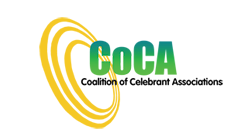Coalition of Celebrant Associations
Suggested Approach to Assessment and Evidence Requirements
General Guidance
As traineeships and apprenticeships are not possible in the delivery of one-off personalised services, the time spent in meeting assessment assignments needs to be considerable to replicate the “placement” conditions applicable in other industriesTrainers must ensure that trainees are given access to individuals and services that will be willing to use the services of celebrant students.
For example, other VET classes or groups may require graduation ceremonies and trainee celebrants could offer to design or deliver such ceremonies, or such groups may be able to offer reciprocal opportunities for students to interact for mutual training benefits, or Toastmaster and Rostrum and other similar clubs may be able to be accessed allowing opportunities to develop public speaking skills in various scenarios.
Assessments must require that the trainee make repeated use of a range of computer, IT technology, other equipment/devices (their own or other service providers') and personal skills that will be needed by independent celebrants in their private practice work environment to:
- engage with potential clients (individuals, couples, families, organisations and communities)
- interact with potential, actual clients and other service providers by mail, email, emailed attachments, scanned documents, mobile phone, answer machines or programs, face-to-face in person interviews, face-to-face interviews by Skype Facetime (or similar technologies), online survey tools
- locate resources (information, poetry, prose, symbols, music, images etc.) utilising web-based searches, online survey tools and other interactions as noted in 2
- research, store, retrieve and back-up resources in computer based or cloud based facilities including word-processing and spreadsheet/ financial management software
- use text software (e.g. Word, Pages) to create text files for documenting ceremonies and other text based documents
- use image websites and software to download, view, crop images and/ or take screenshots to include images in documents, ceremony resource files, etc.
- create, edit and print documents, certificates, memento copies of ceremonies and other resources
- create sound files via computer-based software such as Audacity or Screenflick to enable assessment of oral as well as written skills
- create audio-visual files to demonstrate presentation and performance skills in ceremonies, community talks etc.
- use web based tools such as Monkey Survey, Facebook, and Linkedin etc.
- use web-technology to transfer and/or accept fund transfers online; purchase internet based products and/or services
- register, create passwords and accounts and access resources in web based technology
- web based tools such as dictionaries and thesauruses, tidal and weather information
- find low cost and/or cost and time efficient use of computer, IT technology, other equipment and other service providers (free and/or paid)
Assessments must require that the trainee conduct a number of interactions with people in real situations as well as role-play/ mock situations to expose trainees to a range of real life situations that the celebrant must address confidently, competently and professionally, even if the situation is one that cannot be addressed immediately.
This means that if the unit involves interviews, ceremony planning, design, organisation, reviewing and delivery of a ceremony, a presentation to a group etc., that the trainee will be required to find ways to find suitable people with which to work (e.g. family and/or friends) in delivering actual ceremonial or celebrancy services during the period over which their course is delivered.
Assessments must require that the trainee submit quality work within time frames required and deadlines set to demonstrate time management and organisational skills, as most services provided by celebrants are day and date dependent
Assessment tasks must encourage networking and teamwork with other service providers, especially those relating to industry peak bodies, network groups and web based network services
Assessment tasks must ensure that the trainee makes use of suitable facilities for the delivery of celebrancy services e.g. interviewing, rehearsals and ceremony delivery, and verifies their meeting these requirements as requested


